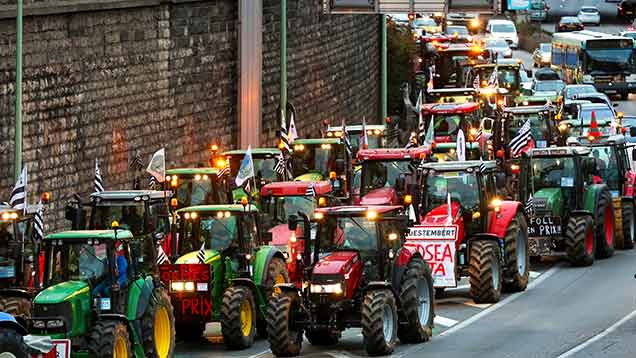UK farmers take fight for fair prices to Brussels
 © LaurentVu/SIPA/Rex SHutterstock
© LaurentVu/SIPA/Rex SHutterstock Thousands of farmers from across Europe will descend on Brussels today in a mass protest about poor returns.
More than 5,000 farmers, including some from the UK, in about 2,000 tractors, are expected to bring the Belgian capital to a standstill later on Monday (7 September).
See also: Live: British farmers join mass protest in Brussels
The protest over low prices has been organised by Copa-Cogeca, the farming body that represents EU farming unions and co-operatives.
It will be staged ahead of an emergency meeting of European agriculture ministers in Brussels to discuss ways to help farmers who have been struggling to cope with prices below the cost of production.
The summit has been called following weeks of farmer protests in the UK and across Europe over low prices.
In the UK, dairy farmers have cleared supermarket shelves of milk and blocked milk distribution depots to protest about low prices paid for liquid milk and milk used to produce cheese.
In France and Belgium, farmers have blockaded roads, set fire to mountains of tyres and brought Paris to a standstill with tractors.
See also: Photos – 1,000 tractor protest as farmers descend on Paris
The NFU will lead a delegation of 30 farmers along with representatives from NFU Cymru, NFU Scotland and the Ulster Farmers’ Union (UFU) to join forces with their European counterparts for the demonstration.
Among the ministers who will attend the Brussels summit are Defra secretary Liz Truss and Northern Ireland’s agriculture minister Michelle O’Neill.
“We need the European Commission to implement measures to ease cashflow difficulties and strengthen safety nets.”
Meurig Raymond, NFU
EU ministers are expected to agree a package of measures to assist the dairy, beef, lamb, pig and fruit and vegetable sectors.
It is understood ministers will consider raising the dairy intervention price – the price at which the EU buys dairy products to support the market – which is currently 16-17p/litre.
Ahead of the meeting, Ms Truss said she would be lobbying for the development of a dairy futures market – similar to those that already exist for grain and sugar – to help the dairy industry through periods of unpredictable price shifts and give farmers more certainty over future prices.
She will ask the EU Commission to convene a specialist taskforce to develop proposals. The minister also announced a wishlist of measures she would like the EU to introduce.
These include increased transparency in the dairy supply chain across Europe to help ensure farmers are being treated openly and fairly, and action to open new markets and reduce tariffs into existing export markets.
“Dairy farmers are a vital part of our £100bn food and farming industry. I want to support the industry to become more resilient and ready to take advantage of the growing demand for British dairy both at home and overseas,” said Ms Truss.
“That is why we are urgently pursuing a range of measures to build on best practice in the industry, provide better promotion of our world-class products and boost support for local producers from the public sector, including government departments, schools and hospitals.”
The NFU is calling on the EU to implement 10 key measures to enable British farmers to better withstand market volatility.
NFU president Meurig Raymond, who will hold talks with Ms Truss after the summit, urged her to stand up strongly for British farming interests in Europe.
He said: “We need the European Commission to implement measures to ease cashflow difficulties and strengthen safety nets.
“We need a long-term approach in the food supply chain. In dairy this means contracts that allow farmers to plan for the future and lock in a milk price reflective of the cost of production.
“British farmers need the GSCOP [Groceries Supply Code of Practice] and groceries code adjudicator to stamp out unfair trading practices in the food supply chain. I want that same protection offered by other member states when British farmers trade with European retailers.
“British shoppers tell us they want to see more British food on the shelves.
“We urge UK ministers to work alongside their devolved and European colleagues to significantly strengthen country-of-origin labelling across all food lines.”
European farmers have been suffering as a result of the Russian ban on EU imports from the west, imposed in August 2014, reduced demand for farm produced in China and a global slump in dairy commodities.
Droughts in Poland and Romania this summer have also piled on the misery for farmers in those countries.
